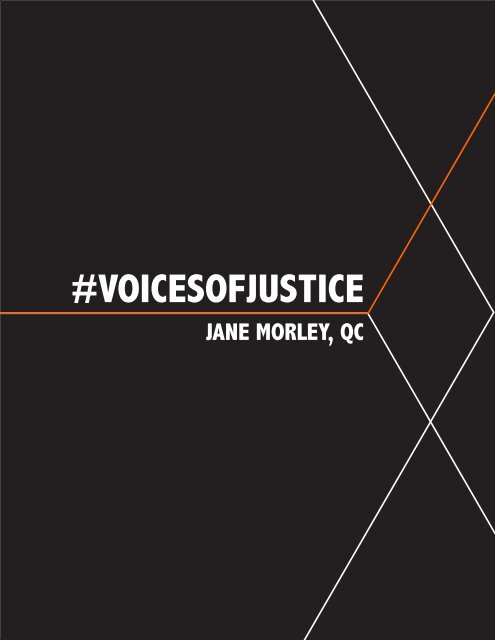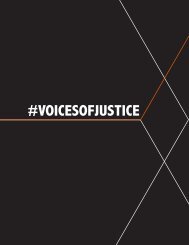Jane Morley – The Justice Hack – Voices of Justice Magazine 2021
A conversation with Jane Morley, QC, Strategic Coordinator with Access to Justice BC, for Voices of Justice, a project that discusses access to justice in British Columbia.
A conversation with Jane Morley, QC, Strategic Coordinator with Access to Justice BC, for Voices of Justice, a project that discusses access to justice in British Columbia.
- No tags were found...
Create successful ePaper yourself
Turn your PDF publications into a flip-book with our unique Google optimized e-Paper software.
#VOICESOFJUSTICE<br />
JANE MORLEY, QC<br />
#VOICESOFJUSTICE
A2JBC’S JANE MORLEY, QC
WE HAVE TO FACE TRUTH FIRST, BEFORE<br />
WE CAN COME TO RECONCILIATION<br />
<strong>Jane</strong> <strong>Morley</strong>, Q.C., is the Strategic Coordinator for Access to <strong>Justice</strong><br />
BC and a principal <strong>of</strong> Restorative Solutions.<br />
What is Access to <strong>Justice</strong> BC’s approach to accomplishing its goals?<br />
Access to <strong>Justice</strong> BC is all about action being done by organizations<br />
within the justice sector. It’s there to inspire action. What’s important is<br />
that it isn’t just any old action, it’s certain kinds <strong>of</strong> actions that are really<br />
going to change the situation for us in terms <strong>of</strong> access to justice. We<br />
developed what we call the Access to <strong>Justice</strong> Approach, which is really<br />
about a shift in the way that Access to <strong>Justice</strong> BC and the justice sector<br />
deals with access to justice and justice reform. <strong>The</strong> shifts are to become<br />
collaborative, to become user centred, to become experimental, and to<br />
become evidence based. Not that there’s none <strong>of</strong> that already there, but<br />
the tendency in the system has been to not be collaborative, but to act in<br />
silos, and to not be user-centred, but to focus on the courts, as opposed to<br />
the users <strong>of</strong> the system.<br />
We are all, as lawyers, somewhat risk averse. And we don’t really like<br />
to experiment because really good experiments will fail. You learn from<br />
failed experiences, <strong>of</strong>ten more than you learn from experiences that are<br />
successful. So that’s a big shift. And then evidence based <strong>–</strong> I think we can<br />
see when we watch the health system how much more evidence based<br />
it is than the justice sector, and that leaves us at a disadvantage, because<br />
we don’t have the evidence that shows that what we’re proposing to do<br />
actually makes a difference.<br />
#VOICESOFJUSTICE
Are there any particular B.C. initiatives you’re<br />
excited about that were created as a result <strong>of</strong><br />
Access to <strong>Justice</strong> BC’s work or involvement?<br />
<strong>The</strong>re are a lot <strong>of</strong> good things happening in B.C.<br />
and it’s really quite impressive. What is interesting<br />
is the response to COVID-19, which really has<br />
forced experiment where there were assumptions<br />
that things couldn’t be done. And they got done.<br />
<strong>The</strong>re was a lot <strong>of</strong> experimentation going on just<br />
out <strong>of</strong> necessity. What I am encouraged by is that<br />
there’s a lot more talk about looking at it from the<br />
user perspective. I think that people are persuaded<br />
that that’s an important thing to do.<br />
What is a restorative approach to justice and<br />
how does it work?<br />
It’s something that was developed out <strong>of</strong> influence<br />
from my work with First Nations and Indigenous<br />
peoples, and that perspective <strong>–</strong> which is a<br />
more holistic perspective. <strong>The</strong> idea is to treat conflict<br />
not necessarily as a bad thing, but as something<br />
that needs to be managed. It’s really about<br />
managing it as a whole, as opposed to thinking <strong>of</strong><br />
it as disputes between two people that need to be<br />
decided upon. We’re all individuals, we all think<br />
differently. We have different cultures, we have<br />
different values. So there’s going to be conflict.<br />
But the real question is, how does one deal with<br />
that conflict in a healthy way for the whole, the<br />
good <strong>of</strong> the whole? And I think that that’s a systemic<br />
kind <strong>of</strong> approach, which I’ve certainly taken<br />
over into my thinking about access to justice and<br />
how we should approach it.<br />
What are some examples <strong>of</strong> how a restorative<br />
approach might work differently than a more<br />
private model <strong>of</strong> dispute resolution?<br />
I’ve done a fair bit <strong>of</strong> work in workplace<br />
disputes, where there may be a complaint about<br />
harassment, for example. Going in and doing an<br />
investigation about facts and deciding whether<br />
there’s been harassment, and then recommending<br />
a penalty <strong>–</strong> that hasn’t worked with organizations.<br />
It usually leaves everybody unhappy. It interferes<br />
with the manager’s ability to manage. Even if<br />
someone is found not guilty, they’ve been hurt<br />
by having the allegation. For the people who are<br />
making the allegation, <strong>of</strong>ten it won’t be held up,<br />
and then they feel that they’ve been negated.<br />
Instead, you go into the workplace, and you say,<br />
“This dispute is the tip <strong>of</strong> the iceberg. We have to<br />
look underneath the surface for a lot <strong>of</strong> different<br />
causes in order to figure out how to move forward<br />
in a healthy way.” And usually, the answers are<br />
not just about resolving a dispute between two<br />
people. It may involve that, but it’s <strong>of</strong>ten the<br />
group dynamics. <strong>The</strong>re may be a need to change<br />
some <strong>of</strong> the conditions <strong>of</strong> employment. <strong>The</strong>re’s a<br />
lot <strong>of</strong> different ways that one can approach it. And<br />
if you take that more holistic approach that looks<br />
at the health <strong>of</strong> the organization, then you’re more<br />
likely to move forward in a positive way.<br />
<strong>The</strong> other approach is one <strong>of</strong> capacity building.<br />
Instead <strong>of</strong> going in as the expert that’s going to<br />
find out what the problem is, diagnose it and<br />
come up with the recommendation, you go in<br />
and say, “How can we increase the capacity <strong>of</strong><br />
the organization to manage this conflict?” It<br />
raises different questions. You do a lot <strong>of</strong> work<br />
with leaders about how they will manage it, as<br />
opposed to going in and managing it.<br />
In terms <strong>of</strong> the individual people who feel<br />
they’ve been wronged, what is their outcome<br />
in a process like that?<br />
I think it does get you asking questions about<br />
what justice is. Lawyers tend to define it in terms<br />
<strong>of</strong> disputes, and fair resolution <strong>of</strong> disputes. I think<br />
that’s only an aspect <strong>of</strong> justice. When you ask<br />
regular folk about what a just life is, it’s a good<br />
life, it’s a good life where they can do what they<br />
want to do. <strong>The</strong>y can look after their children,<br />
they can manage without conflict that gets in the<br />
way and prevents them from fulfilling themselves.<br />
I think it does lead to a different notion <strong>of</strong> what<br />
justice is.<br />
Can you tell us about your experience as a<br />
commissioner on the Truth and Reconciliation<br />
Commission, and how that might have shaped
your approach to access to justice issues?<br />
It had an enormous impact on my thinking.<br />
And in part, I think the reason that I went<br />
down this road <strong>of</strong> a restorative approach<br />
to conflict is because <strong>of</strong> what I learned in<br />
that situation. It also left me with a strong<br />
sense <strong>of</strong> the injustice that we as a country<br />
have done in terms <strong>of</strong> our relationship with<br />
Indigenous people. It left me feeling that<br />
that’s a really, really high priority to change<br />
that relationship.<br />
I think that’s part <strong>of</strong> the restorative approach<br />
<strong>–</strong> that the focus is on relationship. That notion<br />
that everything is about relationship is a<br />
characteristic <strong>of</strong> many, if not all, Indigenous<br />
worldviews. Our history as a country is<br />
one <strong>of</strong> colonialism, and we have a wrong<br />
relationship that needs to be righted. <strong>The</strong><br />
point about truth and reconciliation is that<br />
we need to face the truth. And it’s only when<br />
we do that, that we can turn our relationship<br />
around and have a different relationship,<br />
which is not one <strong>of</strong> ‘power over.’ We have to<br />
face the truth first, before we can come to<br />
reconciliation.<br />
Is there any way to reconcile user-centred<br />
design and restorative approaches to<br />
justice with the justice system being,<br />
almost by definition, a system that exerts<br />
‘power over’?<br />
I think there is, because I think the idea <strong>of</strong> a<br />
user perspective is to ask a power question<br />
like, “Who should be benefiting from the<br />
justice system?” And I think we all as lawyers<br />
would answer, “<strong>The</strong> people that the justice<br />
system is supposed to serve.” But the power<br />
in the setup does not necessarily reflect<br />
that. Central to the different approaches that<br />
Access to <strong>Justice</strong> BC has been promoting is<br />
the user perspective. With the user-centred<br />
approach, we turn everything upside down.<br />
<strong>The</strong> system is primarily designed to work<br />
for the service providers than for the people<br />
served. If we start looking at it from the point<br />
<strong>of</strong> view <strong>of</strong> the people served, we come to<br />
different conclusions about how it should be<br />
designed. We also stop being experts about<br />
how it should be designed. If we’re going to<br />
look at it from a user perspective, we need the<br />
users to help us know what that perspective<br />
is. We have to go outside the justice sector to<br />
other disciplines that have knowledge that is<br />
not legal knowledge, but is necessary in order<br />
to understand what a user perspective might<br />
mean.<br />
Do you think there is a difference between<br />
meeting the needs <strong>of</strong> justice system users<br />
and justice?<br />
It is a difficult question. I think they are<br />
different aspects <strong>of</strong> the same thing. If one just<br />
looks at justice as fulfilling the interests <strong>of</strong> the<br />
people served by the justice system, I think<br />
that’s too narrow a view. I do think the idea <strong>of</strong><br />
rights and the rule <strong>of</strong> law are crucial, but they<br />
need to be looked at from the perspective <strong>of</strong><br />
why they are important.<br />
In the case <strong>of</strong> family law, we put children and<br />
families at the centre, and work from there<br />
in order to get justice. I think there’s some<br />
real power issues there. I also am at heart<br />
a traditionalist and I really believe in the<br />
rule <strong>of</strong> law and in the principles <strong>of</strong> justice.<br />
So I don’t think it’s an either-or proposition.<br />
I am quite influenced by a book I read by<br />
Adam Kahane called Power and Love. Both<br />
<strong>of</strong> them are drives that we have as human<br />
beings, the power drive is the drive <strong>of</strong> self<br />
realization, and the love drive is the need<br />
we have to connect with other people. I’ve<br />
become convinced that it’s not an eitheror<br />
proposition with those. You need them<br />
together. To paraphrase Martin Luther King<br />
Jr., he said power on its own is abusive, and<br />
love on its own is anemic. If you want to have<br />
justice in the world, you need those two to be<br />
working together. That’s how you get from<br />
‘power over.’ <strong>The</strong> power doesn’t disappear,<br />
but it’s a power that’s directed towards good<br />
and just things.<br />
#VOICESOFJUSTICE



